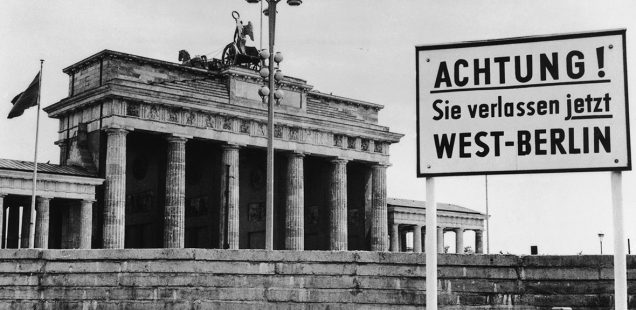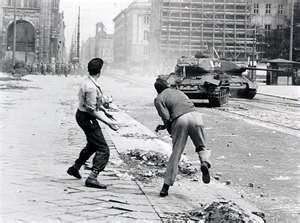
The Wall I Knew
Want to watch a video of me reading this blog? Go to my You Tube Channel.
On a cold Sunday afternoon in January of 2019, a day after the end of the longest government shutdown in United States history, I sat at my kitchen table and thought about the Wall. Not the wall that caused the shutdown. Not the wall President Trump wants to build to protect us against desperate mothers and children in diapers. Not the wall he wants to erect to keep the huddled masses of Central America from contaminating the descendants of the huddled masses who fled Eastern and Southern Europe, Germany, Ireland, England, and Scotland. Not that wall. I’m thinking about the other one, the one that when I was growing up loomed far larger in the American imagination than anything built on our southern border. It loomed large in the imagination of the world. I’m thinking of the Berlin Wall, the wall that for nearly three decades symbolized the division of Europe and the split of the world into enemy camps of East and West. It was the wall that American presidents routinely stood in front of to demand its removal, the wall before which President Kennedy in 1961 announced he was a “BEERliner” and the wall President Reagan in 1987 demanded Gorbachev tear down. It was a wall erected in 1961 and dismantled in 1990 a year after the East German government imploded. It stood for twenty-nine years. Twenty-nine years of a country cut in two, twenty-nine years of families not being able to see one another, twenty-nine years of a wall stopping people from going where they wanted, away from a political regime that wasn’t working for them, from an economy that struggled.
The Berlin Wall ran for twenty-eight miles through that divided city and for seventy-five miles around the perimeter of West Berlin. It was built to prevent East Germans from defecting to the West, though officially it was supposed to be defending them against capitalist aggression. Up until 1961, it was relatively easy to defect to the West through East Berlin. It was not easy to escape over the rest of the East-West German border. The majority of this border was not a continuous wall. It was eight hundred and sixty-six miles of an assortment of barriers: high metal fences and walls in some places, barbed wire in others, alarms, anti-vehicle ditches, watchtowers, automatic booby traps, and minefields. Over all of these impediments hung the “Schiessbefehl,” the East German border guards’ directive to shoot anyone trying to escape. This was the border I experienced in the late nineteen-eighties, the border I crossed. I didn’t cross at Checkpoint Charlie in Berlin. Most people didn’t cross there. They crossed at one of the other ten crossing points dotted along the East-West German border. We crossed to the south at Herleshausen/Wartha.
The border crossing point was unpleasant. You crawled at 20 mph down a road flanked by mine fields and clear-cut shooting zones before you came to the guarded transit lanes where you had to make a series of stops: a stop to show your papers and give up your passport, a stop where they ran mirrors under your car to see if you were smuggling anything, a stop where they searched the inside of your car for the same reason, and the final stop where you got your passport back. I remember staring up at one of the concrete watchtowers, presumably full of border guards ready to shoot me. I wondered what these guards were thinking. They were trained to keep watch for “spies, diversionists, terrorists and smugglers” and day after day all they saw below them were West Germans with cars full of bananas, oranges, and chocolate.
This vast and complex apparatus of physical and psychological control was overwhelming to the traveler. It was meant to be. You were jumpy with nervous tension, but also somehow lamed. As you watched the guards search your car or peer angrily at your passport, dullness and lethargy crept over you. You prayed they wouldn’t find the stack of West German magazines at the bottom of the basket of bananas.
On the day the Wall “fell” in November of 1989, I had been back in New York for only a few months. My partner shook me awake shouting that “the wall was down” and I leaped from my bed and raced to the television to see. Of course, the wall wasn’t down. It still stood, intact and enormous, but instead of a concrete barrier surrounded by emptiness, there were crowds of people dancing on top and young men with pickaxes trying to hack it to pieces. I cried, as I would cry nineteen years later on the night I heard the first commentator announce Barack Obama was President. Both events were emotionally overwhelming, uplifting, and swept away barriers that only hours before had still seemed monumental, permanent, and impossible to overcome.
When I returned to a reunified Germany in 1993, I was able to drive over the former border without stopping. It was a one-way journey from East to West with a former East German who was then commuting between Dresden and Munich. “Tell me when we get to the old border,” I told him, a man who’d never crossed it when it existed.
“Oh, Linda,” he looked contrite. “We crossed about fifteen minutes ago. I thought you knew.”
I was stunned. How was it possible that I could have missed the border? How was it possible to drive past that monolith of concrete and barbed wire without noticing? But the truth was that by 1993, the old apparatus of containment was gone, dismantled or allowed to overgrow.
Let the builders of walls beware.
No matter how much concrete and steel you pour into them, or how many guards you put on patrol, these testaments to hubris and power are fleeting. They may seem impregnable when you build them, impervious to assault, but they can be abandoned overnight and after only a few seasons vanish, carted away or crumbled into dust.
In the end, the Berlin Wall and the fortified border that ran from the Baltic to Czechoslovakia didn’t fall because it failed to do its job. The physical barrier held, but the regime that built it did not. By 1989, the East German regime was politically rotten and economically bankrupt. No one knows how much the financial burden of maintaining the fortifications at the border contributed to this bankruptcy. Perhaps if the money had been spent on the East German people, fewer of them would have wanted to go.
Angela Merkel, the Chancellor of Germany, was born in the East, in the country that more than four million people fled, a thousand of whom were shot and killed trying to make it out. That’s why she didn’t have the stomach to keep a million desperate Middle Eastern and African refugees in purgatory. Angela let them in because she remembered the Wall, but the sad fact is many others appear to have forgotten it. Calls to put the barbed wire back up and keep people out are ringing across Europe as loudly as they ring across America.
I’m not as old as Angela Merkel, but I’m not that much younger either. I didn’t see the Wall go up, but I remember when it stood. The Berlin Wall didn’t go up to keep people out. It was built to keep people in. But I remember what I thought standing under the guns: whenever a country thinks it has to put up a wall to protect its way of life, it’s time for that country to reflect upon that way of life. And think about making some changes.





Really lovely piece, Linda
I remember reading that when Kennedy said, “I am a Berliner,” the translation was bad. He actually said, “I am a jelly donut.” I can’t vouch for the veracity of that.
I recently heard from a reliable source that Kruchev did not say, “We will bury you,”. That was mistranslated into English. He actually said, “We will outlast you.” I suppose it comes to the same thing but “outlast” and “bury” color the meaning so differently.
The word Berliner means both a resident of Berlin and a kind of jelly donut! Neither are pronounced “Beer-liner!” It was a perfect storm of good intentions, poor German pronunciation, and a strong Massachusetts accent!
Whoooeee!! So well written, Linda! Please send it to the NYTimes!
Your article resonated with me as my parents risked their lives, escaping communist Hungary in order to live in a democratic country.
I think if my father were alive today, he would be saddened by the desire of leaders to build a wall.
I am proud of our country, built by immigrants such as my father and the freedom that I have -is a result of his brave decision.
Both of our countries were built by immigrants and continue to be built by them. Even if they look a bit rough when they arrive. When my ancestors emerged from the steerage compartments of the trans-Atlantic ships, I’m sure they didn’t look that great, nor could they speak a word of English.
Kudos. You have a gift of expression. Thanks for sharing.
Yes. Yes. Yes. Speaking as one who worked in the shadow of the Wall, crossed through it more times than I can count, and knew first hand the score on what was going on “da drüben,” I can only say yes, yes, yes. A few years back, I wrote a series of posts about my time there. If I may take the liberty of piggy backing on your great commentary, you can find the first of five posts here: https://salamandersworld.wordpress.com/2015/06/22/west-berlin-stories-part-1/https://salamandersworld.wordpress.com/2015/06/22/west-berlin-stories-part-1/
Thanks, Linda.
Excellent article. The idea of a wall is such a hostile nationalist contrivance and it is ludicrous to think that any wall is more powerful than the human will to survive and thrive.
Linda,
Mirable dictu! You move me to tears with your passion.
Each time I read your posts, I learn more about you personally. I learn more about the world in your simplicity and graphic details. I believe that we are under an American President who (to borrow some words from your article) has and continues to create a vast and complex apparatus of physical and psychological control that divides us. I also remain hopeful that anyone emotionally bankrupt will ultimately crumble and fail.
Yvette, your friend in California
Linda,
Mirable dictu! Thank you! You brought me to tears. Each time I reach your blogs, I learn more about you personally. I learn more about the World in the simplicity of your expression and the graphic details. I remain hopeful that anyone morally and ethically bankrupt will ultimately crumble.
Yvette, your friend in California
My dear Yvette! When did you move to California?!